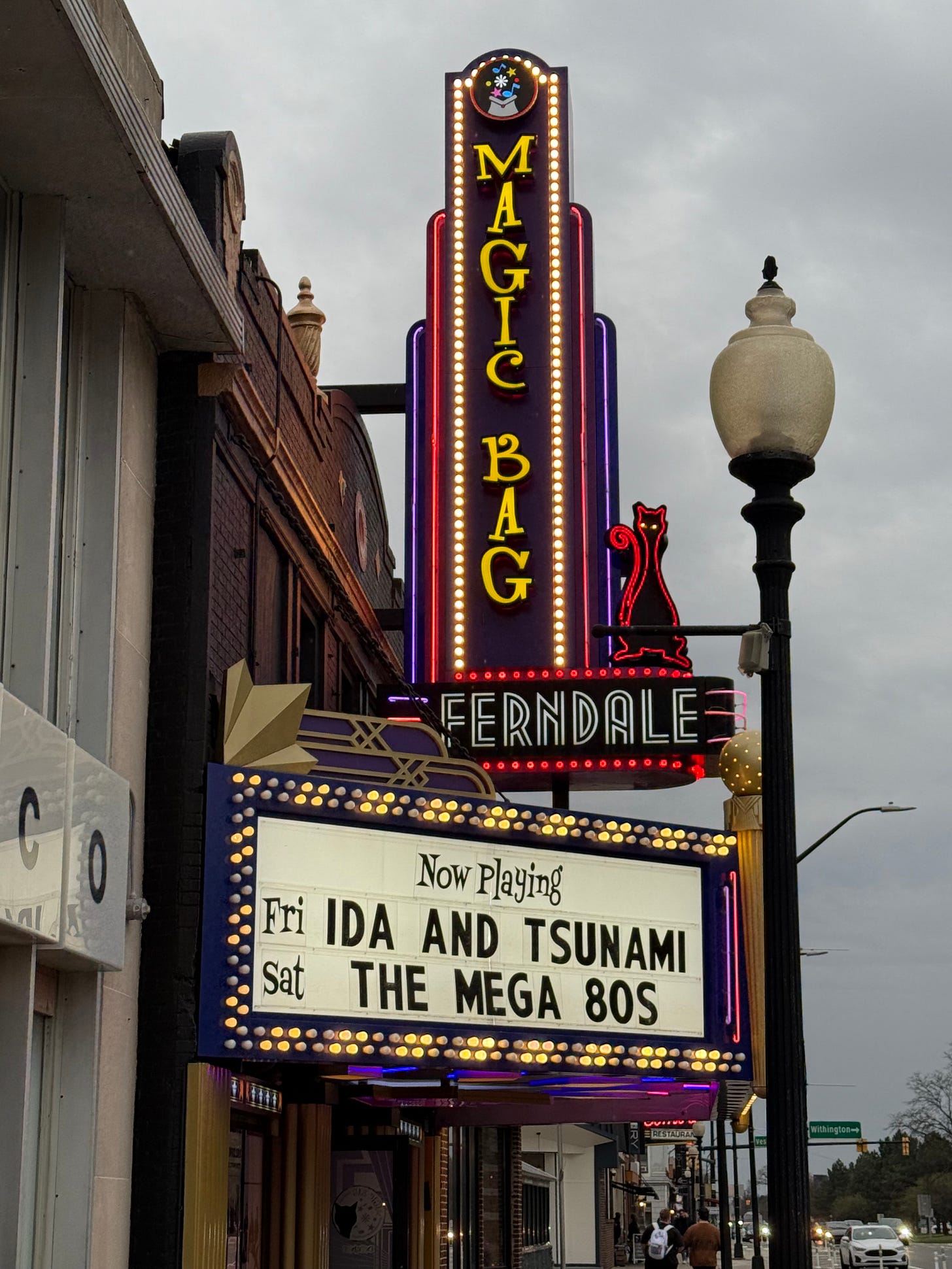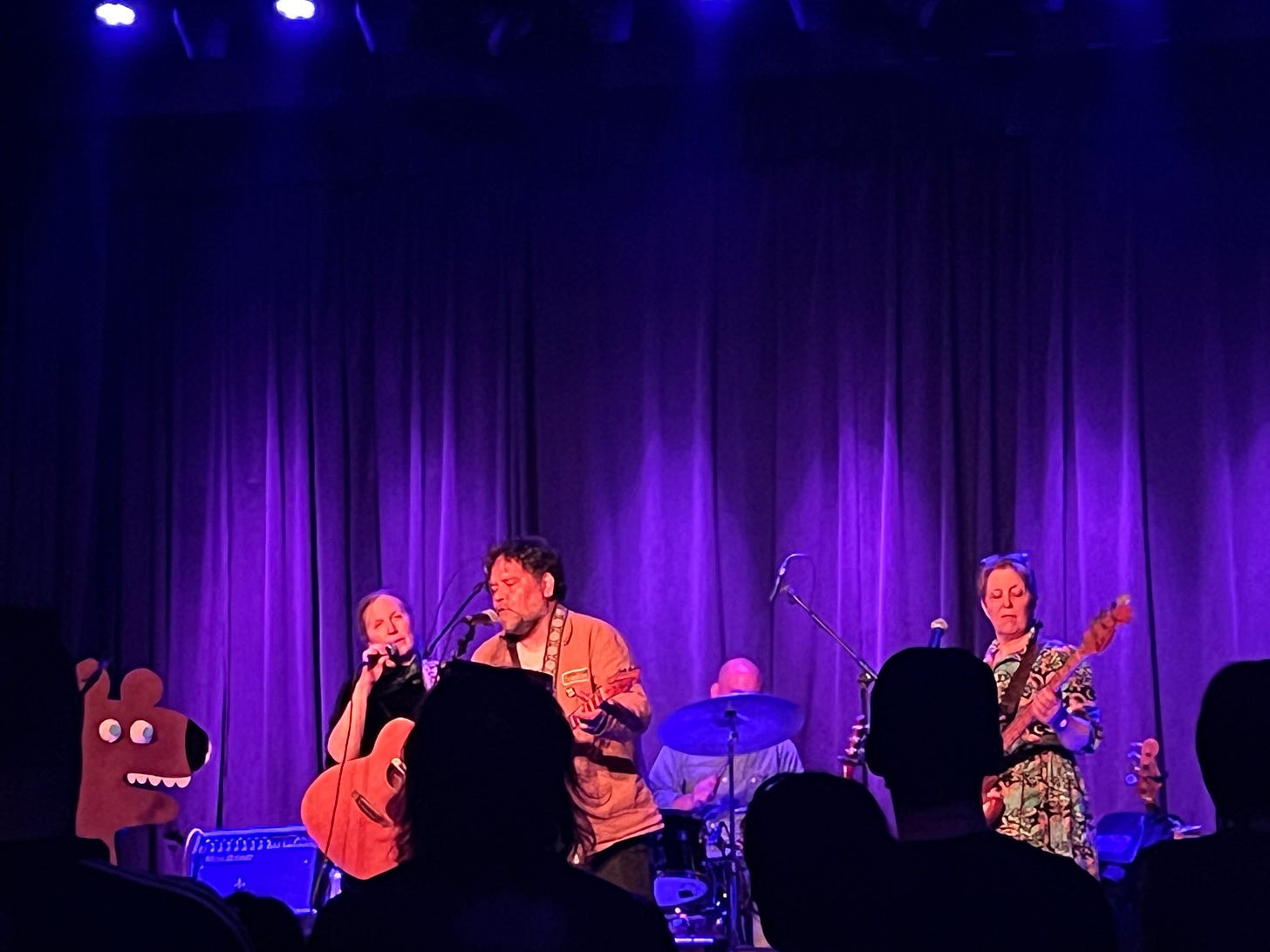what if you could make another life?
ida and tsunami in detroit, plus an archival chat with jenny toomey and kristin thomson
Rediscovery continues to be a dominant force in music reissue circles. Lucky for fans of a certain strain of ’90s indie bands, this has led to an abundance of incredible releases. Velocity Girl reunited for shows and the amazing UltraCopacetic. Numero Group has also issued a lavish Tsunami box set, Loud Is As, and a 20th anniversary show that featured bands like Unwound, Codeine, Chisel, and Karate.
In recent weeks, I have been been fairly obsessed with a forthcoming Ida boxed set on Numero, a 25th anniversary edition of Will You Find Me. Operating in that liminal space between folk, indie, and chamber pop, the album is distinguished by precision: observational lyrics with specific, vidid imagery (“Hear the city hum underneath the pink moonlight”) and elegant instrumentation. Every song is just enough; there’s never an extraneous sound, note or word.
I had the pleasure of reviewing the boxed set for Record Collector (words out soon!) but the music and the band’s Friday night gig in Detroit with Tsunami came along at just the right time. Obviously things in the world (*gestures around*) feel wildly out of control and infuriating, but it was a very hard week emotionally for other reasons, and I needed a concert I knew was going to provide solace and respite. And so my husband and I hopped in the car and trekked to the Magic Bag directly from work.
Ida’s shows with Tsunami are beginning with a hilarious conceit: a coin toss that determines which band is going to open or close the night. Tsunami won last night and opted to headline, meaning the show started with Ida beginning with a reverent, stripped-down tribute to Michael Hurley, who died earlier this week. (Apologies, I didn’t catch the song name.)
Ida is Elizabeth Mitchell and Dan Littleton, with guitarist-vocalist Karla Schickele, Dan’s brother Michael on drums, violinist Jean Cook, and Storey Littleton, Elizabeth and Dan’s daughter. The family-like atmosphere onstage elevated the music, which was quiet but formidable—the equivalent of someone shy who speaks up when they have something important to say.
I’ve been listening to “Maybelle” on repeat, and it was a hands-down live highlight; the song’s surging groove pushed the gleaming harmonies from Littleton, Mitchell and Schickele up and down in the mix, exacerbating the song’s air of uncertainty.
Ida’s set featured a healthy selection of songs from Will You Find Me and other nooks and crannies of the band’s catalog. I didn’t keep a setlist, but “Shrug” and “Les Étoiles Secrète” were standouts. So was “This Water,” a slice of haunting slowcore (the band’s Low comparisons are well-earned). “Back Burner” also brimmed with lovely resignation, while Michael Littleton also took lead on a cover of John Lennon’s “Just Like Starting Over,” a bittersweet moment.
During the set, Storey Littleton stepped to the front of the stage and played her own new single, “At a Diner.” (Prior to the tune, Elizabeth told a funny story about how she was scolded by Thalia Zedek because Storey wasn’t given a chance to perform the song in Boston.) The song was haunting, dusky and sweet—certainly part of Ida’s lineage, but with a distinct antique beauty all its own.
The older I get, the more I’m drawn to women making loud, unruly music. And Tsunami certainly delivered with a raucous headline set that felt absolutely contemporary. (Hilariously enough, though, a joke was made about one song being about A&R men; it was noted that the subject matter felt rather quaint.) Their music dares to be undefined, distinguished by viscous grooves, anguished vocals, and nervy post-punk angles. Co-leaders Jenny Toomey and Kristin Thomson sounded impeccable, singing and playing with primal, effortless urgency.
Tsunami played their ferocious cover of “The Water’s Edge” and afterward gave a shout-out to originator My Dad Is Dead and Cleveland. (I cheered.) “Enter Misguided” was another highlight for me, all slow-boiling disdain: Ostensibly written about slimy music industry folks who get ahead due to supposed brilliance (“And that's the way it's working in a marketplace/If you can talk a better mousetrap you're buying office space”), today it feels like a song that describes what plagued so many other industries. And the appearance from Detroit cult favorite Electric Bear added haywire noise to several songs.
At one point early in Tsunami’s set, Toomey asked the club to turn up the lights so she could see her friends onstage. (As someone who needs progressive lenses and can no longer, say, read tiny words without taking off my glasses, I appreciated the ask.) But I also loved what it represented: Decades of musical collaboration culminating in a celebration of feminist music rooted in community and activism—and the vital importance of music and art in times of great turmoil.
And the encore, where Ida and Tsunami joined forces for a jubilant cover of the B-52s’ “52 Girls” and then a piercing take on Mission of Burma’s “Academy Fight Song,” was perfect. Both are pointed songs: “52 Girls” isn’t just a recitation of the names of women—it’s a song that asserts that women everywhere have agency and deserve recognition—while “Academy Fight Song” obliquely discusses the importance of resistance in the face of oppression. The songs were joyous but also galvanizing — a nod to the idea that when people gather together for a common cause, the impact is immense.
Bonus Article!
Very early in my journalism career, I interviewed Jenny Toomey and Kristin Thomson about a new endeavor they were doing called the Machine. This was associated with Insound, a very early music website that catered to fans of indie and underground music. (The site is no longer active and there are precious few traces of it online, but this 2000 Wired article gives some background.)
I dug up this piece, which ran in the May 2000 issue of Alternative Press, and its focus on community and sharing information—sharing correct, vital information—felt so deeply relevant to the world today. As an early internet adopter, reading about the early days of music on the web made me nostalgic for the ways online relationships and connections felt more centralized and compact back then. It wasn’t just my imagination; there were fewer people and websites online. But the work Toomey and Thomson did with Simple Machines was revolutionary then and continues to reverberate now.
Rage Alongside The Machine
Having Empowered Much Of America's Indie-rock Scene, Jenny Toomey and Kristin Thomson Explore The Possibilities Of Rock On The Web
After weeks of tinkering with the same song, a sudden shining moment of clarity reaches your garage band's practice. Visions of rock stardom flash before your eyes. However, you have only one dilemma: on a limited budget, how will anyone ever hear your opus?
Forget dubbed cassettes or a limited 7" print run: The year 2000 for indie rock means that for little to no money homemade MP3s and websites can distribute music just as well as your local Wal-Mart. But how can you make embryonic tape tracks into digital downloads? How will people find your music online? Should you license your tracks to a large company?
Answers to these questions and more are contained in Jenny Toomey and Kristin Thomson's Internet forum, The Machine, located online as part of the acclaimed indie-music site Insound. From basic things like making MP3s and creating websites to more complicated things like dissecting contracts from digital download companies and defining confusing terminology, the Machine can be the indie world's "resource where people come and share that information for free," according to Toomey.
Toomey and Thomson--part of the noise-punk band Tsunami--were also co-founders of the now-defunct indie label Simple Machines. Taking their cues from DIY imprints like Dischord and Touch And Go, Simple Machines helped to revolutionize the way indie music was created and distributed. When Toomey started exploring ways to keep the label's back catalog in print, the idea of The Machine developed.
"We realized that there was so much information out there and a lot of it conflicting and incredibly fluid," she says. "We noticed that a lot of our peers were signing exclusive digital download contracts or just sort of turning off from the technology because it was too confusing to figure out. And we thought, 'We can set up this site as a place where we can share information, which will help us learn how our community is using this information, and we can use it to also focus our community's attention so they don't get taken advantage of.'"
Still, as Toomey points out, the indie music community today is virtually unrecognizable from the time of Simple Machines. "Back then we existed in a parallel universe, independent of the major label community. Whereas before there was a community of clubs, radio stations and stores that supported that community now that is all sort of folded into major chain stores and major radio stations. There isn't a sort of established support structure for an independent community [today]."
Toomey's hope that the Machine can "replicate that kind of community of information sharing" present in the bygone indie community. Thomson hopes The Machine can at least solidify indie music's role in the process. "I just want to make sure that people understand that they can do things themselves and maintain control of their things without falling prey to potential new schemes on the Internet."





I’m so bummed I missed Tsunsmi on this tour. I could have used that boost of energy. Such an amazing band and as they’ve still got it! Hopefully there’s more opportunity.